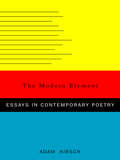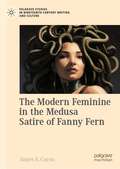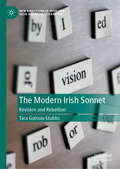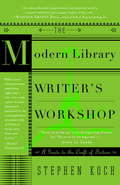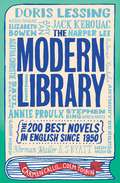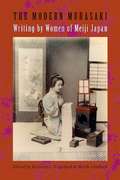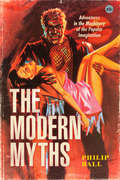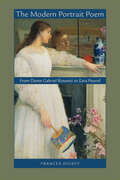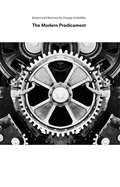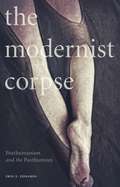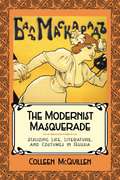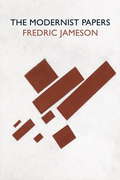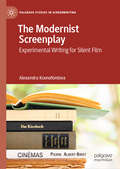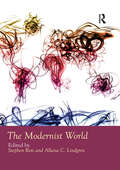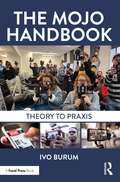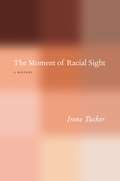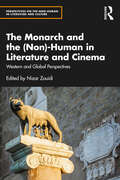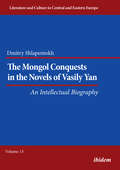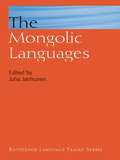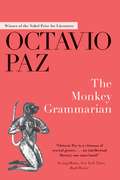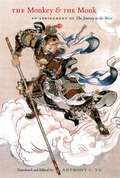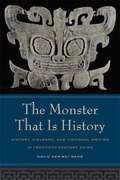- Table View
- List View
The Modern Element: Essays on Contemporary Poetry
by Adam KirschA collection of bold, insightful, and controversial essays by "a poetry critic of the very first order" (New York Times). Over the last ten years, through essays in The New Republic, The New Yorker, and other magazines, Adam Kirsch--"one of the most promising young poet-critics in America" (Los Angeles Times)--has established himself among the most controversial and fearless critics writing today. Sure to cause heated debate, this collection of essays surveys the world of contemporary poetry with boldness and insight, whether Kirsch is scrutinizing the reputation of popular poets such as Billy Collins and Sharon Olds or admiring the achievement of writers as different as Derek Walcott, Czeslaw Milosz, and Frederick Seidel. For readers who want an introduction to the complex world of contemporary American poetry, from major figures like Jorie Graham to the most promising poets of the younger generation, Kirsch offers close readings and bold judgments. For readers who already know that world, The Modern Element will offer a surprising and thought-provoking new perspective.
The Modern Feminine in the Medusa Satire of Fanny Fern (Palgrave Studies in Nineteenth-Century Writing and Culture)
by James E. CaronThe Modern Feminine in the Medusa Satire of Fanny Fern argues that Sara Parton and her literary alter ego, Fanny Fern, occupy a star-power position within the antebellum literary marketplace dominated by women authors of sentimental fiction, writers Nathaniel Hawthorne (in)famously called “the damn mob of scribbling women.” The Fanny Fern persona represents a nineteenth-century woman voicing the modern feminine within a laughter-provoking bourgeois carnival, a forerunner of Hélène Cixous’s laughing Medusa figure and her theory about écriture féminine. By advancing an innovative theory about an Anglo-American aesthetic, comic belles lettres, Caron explains the comic nuances of Parton’s persona, capable of both an amiable and a caustic satire. The book traces Parton’s burgeoning celebrity, analyzes her satires on cultural expectations of gendered behavior, and provides a close look at her variegated comic style. The book then makes two first-order conclusions: Parton not only offers a unique profile for antebellum women comic writers, but her Fanny Fern persona also anchors a potential genealogy of women comic writers and activists, down to the present day, who could fit Kate Clinton’s concept of fumerism, a feminist style of humor that fumes, that embraces the comic power of a Medusa satire.
The Modern Historiography Reader: Western Sources (Routledge Readers in History)
by Adam Budd<p>In The Modern Historiography Reader, Adam Budd guides readers through European and North American developments in history-writing since the eighteenth century. Starting with Enlightenment history and moving through subjects such as moral history, national history, the emergence of history as a profession, and the impact of scientific principles on history, he then looks at some of the most important developments in twentieth-century historiography such as social history, traumatic memory, postcolonialism, gender history, postmodernism, and the history of material objects. <p>This is the only book that brings together historiographical writing from anthropology, literary theory, philosophy, psychology, and sociology – as well as history. Each of the thirteen thematic sections begins with a clear introduction that familiarizes readers with the topics and articles, setting them in their wider contexts. They explain what historiography is, how historians’ perspectives and sources determine the kinds of questions they ask, and discuss how social and ideological developments have shaped historical writing over the past three centuries. <p>With a glossary of critical terms and reading lists for each section, The Modern Historiography Reader: Western Sources is the perfect introduction to modern historiography.</p>
The Modern Irish Sonnet: Revision and Rebellion (New Directions in Irish and Irish American Literature)
by Tara Guissin-StubbsThe Modern Irish Sonnet: Revision and Rebellion discusses how and why the sonnet appeals to Irish poets and has grown in popularity over the last century. Using a thematic approach, Tara Guissin-Stubbs argues for the significance of the Irish sonnet as a discrete entity within modern and contemporary poetry, and shows how the Irish sonnet has become a debating chamber for discussions concerning the relationship between Irish and British culture, poetry and gender, and revision and rebellion. The text reshapes the poetic and critical field, exploring canonical and non-canonical poems by male and female poets so as to challenge outmoded views of the thematic and formal limitations of the sonnet.
The Modern Library Writer's Workshop
by Stephen Koch“Make [your] characters want something right away—even if it’s only a glass of water. Characters paralyzed by the meaninglessness of modern life still have to drink water from time to time. ” —Kurt Vonnegut “‘The cat sat on the mat’ is not the beginning of a story, but ‘the cat sat on the dog’s mat’ is. ” —John Le Carré Nothing is more inspiring for a beginning writer than listening to masters of the craft talk about the writing life. But if you can’t get Vladimir Nabokov, Virginia Woolf, and Gabriel García Márquez together at the Algonquin,The Modern Library Writer’s Workshopgives you the next best thing. Stephen Koch, former chair of Columbia University’s graduate creative writing program, presents a unique guide to the craft of fiction. Along with his own lucid observations and commonsense techniques, he weaves together wisdom, advice, and inspiring commentary from some of our greatest writers. Taking you from the moment of inspiration (keep a notebook with you at all times), to writing a first draft (do it quickly! you can always revise later), to figuring out a plot (plot always serves the story, not vice versa), Koch is a benevolent mentor, glad to dispense sound advice when you need it most. The Modern Library Writer’s Workshopbelongs on every writer’s shelf, to be picked up and pored over for those moments when the muse needs a little help finding her way. From the Trade Paperback edition.
The Modern Library: The 200 Best Novels in English Since 1950
by Colm Toibin Carmen CallilFor Colm Toíbín and Carmen Callil there is no difference between literary and commercial writing - there is only the good novel: engrossing, inspirational, compelling. In their selection of the best 200 novels written since 1950, the editors make a case for the best and the best-loved works and argue why each should be considered a modern classic. Enlightening, often unexpected and always engaging this tour through the world of fiction is full of surprises, forgotten masterpieces and a valuable guide to what to read next. Authors in the collection include Agatha Christie, Georgette Heyer, Daphne du Maurier, Patrick Hamilton, Carson McCullers, J. D. Salinger, Bernard Malamud; Flannery O'Connor, Mulk Raj Anand, Raymond Chandler, L. P. Hartley, Amos Tutuola, Sylvia Townsend Warner, Samuel Beckett, Patricia Highsmith, Chinua Achebe, Isak Dineson, Alan Sillitoe, Ivy Compton-Burnett, Grace Paley, Harper Lee, Olivia Manning and Mordecai Richler.
The Modern Library: The Two Hundred Best Novels In English Since 1950 (Brief Guide To... Ser.)
by Colm Toibin Carmen CallilFor Colm Toibin and Carmen Callil there is no difference between literary and commercial writing - there is only the good novel: engrossing, inspirational, compelling. In their selection of the best 200 novels written since 1950, the editors make a case for the best and the best-loved works and argue why each should be considered a modern classic. Enlightening, often unexpected, and always engaging this tour through the world of fiction is full of surprises, forgotten masterpieces and a valuable guide to what to read next. Authors include:Agatha Christie, Henry Green, Frank Hardy, Georgette Heyer, J. D. Salinger, Ralph Ellison, Ernest Hemingway, Bernard Malamud, R. K. Narayan, Flannery O'Connor, John Steinbeck, Evelyn Waugh, Mulk Raj Anand, James Baldwin, Saul Bellow, Raymond Chandler, L. P. Hartley, Rosamund Lehmann, Amos Tutuola, Kingsley Amis, William Golding, Elizabeth Jenkins, Sylvia Townsend Warner, Samuel Beckett, Patricia Highsmith, Vladimir Nabokov, Janet Frame, Jack Kerouac, Elizabeth Taylor, Rebecca West, Chinua Achebe, Olivia Manning, John Updike, P. G. Wodehouse, Joseph Heller, V. S. Naipaul, Muriel Spark, Patrick White, Maureen Duffy, William Faulkner, Doris Lessing, Edna O'Brien, Katherine Anne Porter, Elizabeth Bowen, John Le CarrÈ, Mary McCarthy, Sylvia Plath, Wilson Harris, Hubert Selby Jr., Frank Sargeson, Wole Soyinka, Margaret Laurence, Jean Rhys, Paul Scott, John Fowles, Christina Stead, William Styron, Ngugi Wa Thiong'o, William H. Gass,Iris Murdoch, B. S. Johnson, Mary Lavin, Mario Puzo, Robertson Davies, Patrick O'Brian, Eudora Welty, J. G. Farrell, Thomas Pynchon, E. L. Doctorow, Ruth Prawer Jhabvala, David Lodge, Alistair MacLeod, Graham Greene, Roy A. K. Heath, Ian McEwan, Thomas Flanagan, Martin Amis, J. G. Ballard, Julian Barnes, Anita Desai, Balraj Khanna, Cormac McCarthy, Raymond Carver, Frank Moorhouse, Bapsi Sidhwa, Anne Tyler, Tom Wolfe, John Banville, Oscar Hijuelos, Amy Tan, A. S. Byatt, J. M. Coetzee, Micheal Cunningham, Roddy Doyle, David Malouf, Alice Munro, Pat Barker, Angela Carter, Amit Chaudhuri, Bret Easton Ellis, Timothy Mo, Norman Rush, Iain Sinclair, Patrick McCabe, Donna Tartt, Jeffrey Eugenides, Gita Mehta, E. Annie Proulx, Will Self, Irvine Welsh, Sebastian Faulks, Vikram Seth, Jonathan Coe, Louis de BerniËres, Alan Hollinghurst, P. D. James, James Kelman, T. Coraghessan Boyle, Penelope Fitzgerald, Rohinton Mistry, Margaret Atwood, Patrick McGrath, Graham Swift, Tobias Wolff, Jim Crace, Don DeLillo, Philip Roth.
The Modern Murasaki: Writing by Women of Meiji Japan (Asia Perspectives: History, Society, and Culture)
by Rebecca Copeland Melek OrtabasiThe first anthology of its kind, The Modern Murasaki brings the vibrancy and rich imagination of women's writing from the Meiji period to English-language readers. Along with traditional prose, the editors have chosen and carefully translated short stories, plays, poetry, speeches, essays, and personal journal entries. Selected readings include writings by the public speaker Kishida Toshiko, the dramatist Hasegawa Shigure, the short-fiction writer Shimizu Shikin, the political writer Tamura Toshiko, and the novelists Miyake Kaho, Higuchi Ichiyo, Tazawa Inabune, Kitada Usurai, Nogami Yaeko, and Mizuno Senko. The volume also includes a thorough introduction to each reading, an extensive index listing historical, social, and literary concepts, and a comprehensive guide to further research.The fierce tenor and bold content of these texts refute the popular belief that women of this era were passive and silent. A vital addition to courses in women's studies and Japanese literature and history, The Modern Murasaki is a singular resource for students and scholars.
The Modern Myths: Adventures in the Machinery of the Popular Imagination
by Philip BallWith The Modern Myths, brilliant science communicator Philip Ball spins a new yarn. From novels and comic books to B-movies, it is an epic exploration of literature, new media and technology, the nature of storytelling, and the making and meaning of our most important tales. Myths are usually seen as stories from the depths of time—fun and fantastical, but no longer believed by anyone. Yet, as Philip Ball shows, we are still writing them—and still living them—today. From Robinson Crusoe and Frankenstein to Batman, many stories written in the past few centuries are commonly, perhaps glibly, called “modern myths.” But Ball argues that we should take that idea seriously. Our stories of Dracula, Dr. Jekyll and Mr. Hyde, and Sherlock Holmes are doing the kind of cultural work that the ancient myths once did. Through the medium of narratives that all of us know in their basic outline and which have no clear moral or resolution, these modern myths explore some of our deepest fears, dreams, and anxieties. We keep returning to these tales, reinventing them endlessly for new uses. But what are they really about, and why do we need them? What myths are still taking shape today? And what makes a story become a modern myth? In The Modern Myths, Ball takes us on a wide-ranging tour of our collective imagination, asking what some of its most popular stories reveal about the nature of being human in the modern age.
The Modern Portrait Poem: From Dante Gabriel Rossetti to Ezra Pound
by Frances DickeyIn The Modern Portrait Poem, Frances Dickey recovers the portrait as a poetic genre from the 1860s through the 1920s. Combining literary and art history, she examines the ways Dante Gabriel Rossetti, Algernon Swinburne, and J. M. Whistler transformed the genre of portraiture in both painting and poetry. She then shows how their new ways of looking at and thinking about the portrait subject migrated across the Atlantic to influence Ezra Pound, T. S. Eliot, William Carlos Williams, Amy Lowell, E. E. Cummings, and other poets. These poets creatively exposed the Victorian portrait to new influences ranging from Manet’s realism to modern dance, Futurism, and American avant-garde art. They also condensed, expanded, and combined the genre with other literary modes including epitaph, pastoral, and Bildungsroman. Dickey challenges the tendency to view Modernism as a break with the past and as a transition from aural to visual orientation. She argues that the Victorian poets and painters inspired the new generation of Modernists to test their vision of Aestheticism against their perception of modernity and the relationship between image and text. In bridging historical periods, national boundaries, and disciplinary distinctions, Dickey makes a case for the continuity of this genre over the Victorian/Modernist divide and from Britain to the United States in a time of rapid change in the arts.
The Modern Predicament: Essays and Reviews
by George ScialabbaEssays and reviews concentrating on politics, economics, sociology and culture. With a forward by Barbara Ehrenreich. Most of the essays began as book reviews. As book reviews they were superior when published. As essays they are exceptional for their intelligence and clarity. George’s subjects are politics, religion and society. His subject is what people who are thinking ought to be paying attention to. The current cliché is that America has no public intellectuals. Every sentence George writes gives the lie to this bit of lazy journalese.
The Modernist Corpse: Posthumanism and the Posthumous
by Erin E. EdwardsAn unconventional take on the corpse challenges traditional conceptions of who—and what—counts as human, while offering bold insights into the modernist project Too often regarded as the macabre endpoint of life, the corpse is rarely discussed and largely kept out of the public eye. In The Modernist Corpse, Erin E. Edwards unearths the critically important but previously buried life of the corpse, which occupies a unique place between biology and technology, the living and the dead. Exploring the posthumous as the posthuman, Edwards argues that the corpse is central to understanding relations between the human and its &“others,&” including the animal, the machine, and the thing.From photographs of lynchings to documentation of World War I casualties, the corpse is also central to the modernist project. Edwards turns critical attention to the corpse through innovative, posthumanist readings of canonical thinkers such as William Faulkner, Jean Toomer, W. E. B. Du Bois, Mina Loy, Djuna Barnes, and Gertrude Stein, offering new insights into the intersections among race, gender, technical media, and matter presumed to be dead. Edwards&’s expansive approach to modernism includes diverse materials such as Hollywood film, experimental photography, autopsy discourses, and the comic strip Krazy Kat, producing a provocatively broad understanding of the modernist corpse and its various &“lives.&”The Modernist Corpse both establishes important new directions for modernist inquiry and overturns common thought about the relationship between living and dead matter.
The Modernist Masquerade
by Colleen McquillenMasked and costume balls thrived in Russia in the late nineteenth and early twentieth centuries during a period of rich literary and theatrical experimentation. The first study of its kind, The Modernist Masquerade examines the cultural history of masquerades in Russia and their representations in influential literary works. The masquerade's widespread appearance as a literary motif in works by such writers as Anna Akhmatova, Leonid Andreev, Andrei Bely, Aleksandr Blok, and Fyodor Sologub mirrored its popularity as a leisure-time activity and illuminated its integral role in the Russian modernist creative consciousness. Colleen McQuillen charts how the political, cultural, and personal significance of lavish costumes and other forms of self-stylizing evolved in Russia over time. She shows how their representations in literature engaged in dialog with the diverse aesthetic trends of Decadence, Symbolism, and Futurism and with the era's artistic philosophies.
The Modernist Papers
by Fredric JamesonCultural critic Fredric Jameson, renowned for his incisive studies of the passage of modernism to postmodernism, returns to the movement that dramatically broke with all tradition in search of progress for the first time since his acclaimed A Singular Modernity .The Modernist Papers is a tour de froce of anlysis and criticism, in which Jameson brings his dynamic and acute thought to bear on the modernist literature of the nineteenth and twentieth centuries. Jameson discusses modernist poetics, including intensive discussions of the work of Baudelaire, Rimbaud, Mallarmé, Wallace Stevens, Joyce, Proust, and Thomas Mann. He explores the peculiarties of the American literary field, taking in William Carlos Williams and the American epic, and examines the language theories of Gertrude Stein. Refusing to see modernism as simply a Western phenomenon he also pays close attention to its Japanese expression; while the complexities of a late modernist representation of twentieth-century politics are articulated in a concluding section on Peter Weiss's novel The Aesthetics of Resistance.Challenging our previous understanding of the literature of this pperiod, this monumental work will come to be regarded as the classic study of modernism.
The Modernist Screenplay: Experimental Writing for Silent Film (Palgrave Studies in Screenwriting)
by Alexandra KsenofontovaThe Modernist Screenplay explores the film screenplay as a genre of modernist literature. It connects the history of screenwriting for silent film to the history of literary modernism in France, Germany, and Russia. At the same time, the book considers how the screenplay responded to the modernist crisis of reason, confronted mimetic representation, and sought to overcome the modernist mistrust of language with the help of rhythm. From the silent film projects of Bertolt Brecht, to the screenwriting of Sergei Eisenstein and the poetic scripts of the surrealists, The Modernist Screenplay offers a new angle on the relationship between film and literature. Based on the example of modernist screenwriting, the book proposes a pluralistic approach to screenplays, an approach that sees film scripts both as texts embedded in film production and as literary works in their own right. As a result, the sheer variety of different and experimental ways to tell stories in screenplays comes to light. The Modernist Screenplay explores how the earliest kind of experimental screenplays—the modernist screenplays—challenged normative ideas about the nature of filmmaking, the nature of literary writing, and the borders between the two.
The Modernist World (Routledge Worlds)
by Allana Lindgren Stephen RossThe Modernist World is an accessible yet cutting edge volume which redraws the boundaries and connections among interdisciplinary and transnational modernisms. The 61 new essays address literature, visual arts, theatre, dance, architecture, music, film, and intellectual currents. The book also examines modernist histories and practices around the globe, including East and Southeast Asia, South Asia, Sub-Saharan Africa, Australia and Oceania, Europe, Latin America, the Middle East and the Arab World, as well as the United States and Canada. A detailed introduction provides an overview of the scholarly terrain, and highlights different themes and concerns that emerge in the volume. The Modernist World is essential reading for those new to the subject as well as more advanced scholars in the area – offering clear introductions alongside new and refreshing insights.
The Modular Architecture of Grammar
by Jerrold M. SadockModular grammar postulates several autonomous generative systems interacting with one another as opposed to the prevailing theory of transformational grammar where there is a single generative component - the syntax - from which other representations are derived. In this book Jerrold Sadock develops his influential theory of grammar, formalizing several generative modules that independently characterize the levels of syntax, semantics, role structure, morphology and linear order, as well as an interface system that connects them. Multi-modular grammar provides simpler, more intuitive analyses of grammatical phenomena and allows for greater empirical coverage than prevailing styles of grammar. The book illustrates this with a wide-ranging analysis of English grammatical phenomena, including raising, control, passive, inversion, do-support, auxiliary verbs and ellipsis. The modules are simple enough to be cast as phrase structure grammars and are presented in sufficient detail to make descriptions of grammatical phenomena more explicit than the approximate accounts offered in other studies.
The Mojo Handbook: Theory to Praxis
by Ivo BurumThe Mojo Handbook: Theory to Praxis offers a detailed and engaging crash course on how to use mobile tools to create powerful journalistic stories. Drawing on both theoretical underpinnings and practical techniques, the book outlines the fundamentals of mobile journalism methods, by placing mobile storytelling within a wider context of current affairs, documentary filmmaking and public relations. The book offers expert advice for how to use storytelling skills to transform mobile content into engaging and purposeful user-generated stories for audiences. Topics covered include tips for recording dynamic video and clean audio, conducting interviews on your phone and editing and post-production processes, as well as advice on how to handle copyright issues and a primer on journalistic ethics. The book also includes a comprehensive glossary of terms to help students navigate the video production and mobile journalism world. The Mojo Handbook is a valuable resource for aspiring multimedia professionals in journalism, strategic and corporate communication, community and education, as well as anyone looking to incorporate mobile into their visual storytelling tool kit.
The Moment of Racial Sight: A History
by Irene TuckerThe Moment of Racial Sight overturns the most familiar form of racial analysis in contemporary culture: the idea that race is constructed, that it operates by attaching visible marks of difference to arbitrary meanings and associations. Searching for the history of the constructed racial sign, Irene Tucker argues that if people instantly perceive racial differences despite knowing better, then the underlying function of race is to produce this immediate knowledge. Racial perception, then, is not just a mark of acculturation, but a part of how people know one another. Tucker begins her investigation in the Enlightenment, at the moment when skin first came to be used as the primary mark of racial difference. Through Kant and his writing on the relation of philosophy and medicine, she describes how racialized skin was created as a mechanism to enable us to perceive the likeness of individuals in a moment. From there, Tucker tells the story of instantaneous racial seeing across centuries—from the fictive bodies described but not seen in Wilkie Collins’s realism to the medium of common public opinion in John Stuart Mill, from the invention of the notion of a constructed racial sign in Darwin’s late work to the institutionalizing of racial sight on display in the HBO series The Wire. Rich with perceptive readings of unexpected texts, this ambitious book is an important intervention in the study of race.
The Monarch and the: Western and Global Perspectives (Perspectives on the Non-Human in Literature and Culture)
by Nizar ZouidiThis collection studies the representations of the character of the monarch in literature and cinema. Being a person, an institution, a character archetype and a narrative role, the characters of the monarch and other royal or regal characters oscillate between humanity and the non-human. As such, they are hybrid forms of existence and subjectivity. The authors of this collection explore this hybridity across large spectra of genres, historical periods and cultural contexts. Some of the most prolific and widely read scholars analyze the archetype of the monarch on the page, the stage and the screen. They cover large swathes of intersecting creative and interpretive territories including ancient epic and religious poetry, Arthurian legends, British Renaissance and modern drama, British horror films and Hollywood crime and sports films. This collection also features interviews with six prominent comic book writers and artists, who discuss the influence of classical royal archetypes on their works.
The Mongol Conquests in the Novels of Vasily Yan: An Intellectual Biography (Literature and Culture in Central and Eastern Europe #15)
by Dmitry ShlapentokhVasily Yan (Vassily Grigoryevich Yanchevetsky, 1874–1954) was a writer of historical novels whose popularity survives the test of time. He was widely read throughout the Soviet era and continues to be popular in the post-Soviet era. This book is not just a biographical sketch of an important Russian/Soviet writer basically unknown to the Western public. The focus on Yan and his work also demonstrates the role of ideology in a totalitarian society. Shlapentokh shows that ideology and cultural and intellectual life in totalitarian regimes are more complex than is often assumed. Intellectuals often engaged in stressful, but—in its literary outcome—captivating "cat and mouse" games with censors, the powerful, and the government.
The Mongolic Languages (Routledge Language Family Series #Vol. 5)
by Juha JanhunenOnce the rulers of the largest land empire that has ever existed on earth, the historical Mongols of Chinggis Khan left a linguistic heritage which today survives in the form of more than a dozen different languages, collectively termed Mongolic. For general linguistic theory, the Mongolic languages offer interesting insights to problems of areal typology and structural change. An understanding of the Mongolic language family is also a prerequisite for the study of Mongolian and Central Eurasian history and culture. This volume is the first comprehensive treatment of the Mongolic languages in English, written by an international team of specialists.
The Monkey Grammarian: Conjunctions And Disjunctions - Marcel Duchamp - Appearance Stripped Bare - The Monkey Grammarian - On Poets And Others - Alternating Current (Arcade Classics Ser.)
by Ilan Stavans Octavio PazNobel Prize–winner Octavio Paz offers a dazzling mind journey to the sources of poetry. Poet, diplomat, writer, philosopher, hailed as an “intellectual literary one-man band” by the New York Times Book Review, Nobel Prize–winner Octavio Paz was a key figure in the Latin American Literary Renaissance and in world literature. In this entrancing work, part prose-poem and part rumination on the origins of language and the antic, erotic, sacred nature of poetry, Paz takes inspiration from Hanuman, the red-faced monkey chief and ninth grammarian of Hindu mythology. On a journey to the temple city of Galta in India—which Paz finds partially ruined in a leaf-filled countryside surrounded by forbidding hills—Hanuman’s mythical encounters serve as the springboard for the poet’s speculations on all manners of things, from movement and fixity to meaning and identity, the reality behind language, and the nature of nature. Images of the holy city, complete with the marauding monkeys for which it is known, constantly obtrude on his musings. Perhaps the most poetic of Paz’s prose works, The Monkey Grammarian is visual: every page is rich in images, of palaces and temples, pilgrims and sadhus, and the monkey god himself. Paz’s probing, crystalline prose makes this an unforgettable voyage of the mind.
The Monkey and the Monk: An Abridgment of The Journey to the West
by Anthony C. YuA compact abridgment of the legendary Chinese classic that inspired the hit game Black Myth: Wukong! Anthony C. Yu’s celebrated translation of The Journey to the West reinvigorated one of Chinese literature’s most beloved classics for English-speaking audiences when it first appeared thirty years ago. Yu’s abridgment of his four-volume translation, The Monkey and the Monk, finally distills the epic novel’s most exciting and meaningful episodes without taking anything away from their true spirit. These fantastic episodes recount the adventures of Xuanzang, a seventh-century monk who became one of China’s most illustrious religious heroes after traveling for sixteen years in search of Buddhist scriptures. Powerfully combining religious allegory with humor, fantasy, and satire, accounts of Xuanzang’s journey were passed down for a millennium before culminating in the sixteenth century with The Journey to the West. Now, readers of The Monkey and the Monk can experience the full force of his lengthy quest as he travels to India with four animal disciples, most significant among them a guardian-monkey known as “the Great Sage, Equal to Heaven.” Moreover, in its newly streamlined form, this acclaimed translation of a seminal work of world literature is sure to attract an entirely new following of students and fans. “A new translation of a major literary text which totally supersedes the best existing version. . . . It establishes beyond contention the position of The Journey to the West in world literature, while at the same time throwing open wide the doors to interpretive study on the part of the English audience.”—Modern Language Notes, on the unabridged translation
The Monster That Is History: History, Violence, and Fictional Writing in Twentieth-century China
by David WangIn ancient China a monster called Taowu was known for both its vicious nature and its power to see the past and the future. Over the centuries Taowu underwent many incarnations until it became identifiable with history itself. Since the seventeenth century, fictive accounts of history have accommodated themselves to the monstrous nature of Taowu. Moving effortlessly across the entire twentieth-century literary landscape, David Der-wei Wang delineates the many meanings of Chinese violence and its literary manifestations. Taking into account the campaigns of violence and brutality that have rocked generations of Chinese--often in the name of enlightenment, rationality, and utopian plenitude--this book places its arguments along two related axes: history and representation, modernity and monstrosity. Wang considers modern Chinese history as a complex of geopolitical, ethnic, gendered, and personal articulations of bygone and ongoing events. His discussion ranges from the politics of decapitation to the poetics of suicide, and from the typology of hunger and starvation to the technology of crime and punishment.
